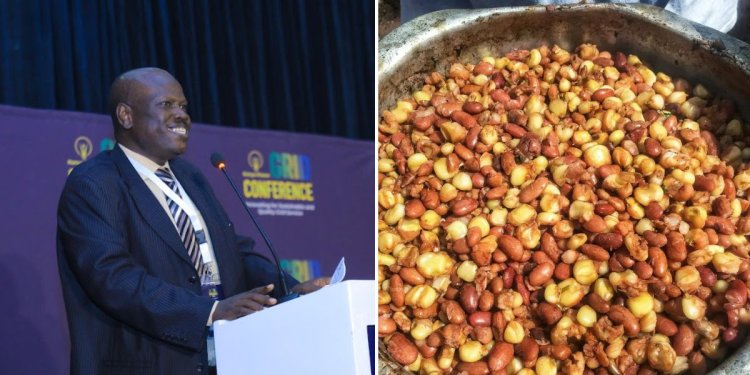Kenya Power's Plan After CEO's Claim Of Boiling Githeri With Ksh20
This was disclosed by Siror during the launch of the Global eCooking Coalition (GeCCo) during the Africa Climate Week in Nairobi.

Just two days after Kenya Power Chief Executive Officer (CEO), Joseph Siror sparked wild reactions across the country after revealing that one can boil succotash, locally known as githeri with Ksh20 worth of electricity, the monopoly firm has a new plan in the works.
Kenya Power revealed on Thursday, September 7 that it is actively promoting the adoption of electric cooking (e-cooking) among its 9.2 million customers with a target to increase uptake from approximately 90,000 current users to over 500,000 users in three years.
This was disclosed by Siror during the launch of the Global eCooking Coalition (GeCCo) at the Africa Climate Week in Nairobi.
The CEO complained that Kenyans have negatively painted cooking with electricity, attributing this to the high cost of electricity itself, thus they only allocate electricity to vital cooking appliances and leave cooking to fuel products such as cooking gas.

Image of an electric cooker. /iSTOCK
"Electricity has traditionally been viewed as the expensive cooking alternative by many Kenyans. Middle-class households often own task-specific electric cooking appliances such as kettles or microwaves but rely on liquefied petroleum gas for the bulk of their cooking.
"However, this is no longer the case as recent studies have shown. There is, therefore, an enormous untapped potential for e-cooking in the country," stated Siror.
Recent data indicates that only one per cent of electricity customers use electricity to cook, with the majority of Kenyans primarily relying on wood fuel and gas.
GeCCo is an initiative aimed at accelerating the transition from traditional cooking methods to e-cooking, both domestically and commercially.
The coalition consists of the Global Energy Alliance for People and Planet (GEAPP), Modern Energy Cooking Services (MECS), Sustainable Energy for All (SEforALL), and Energising Development (EnDev) among others.
"Kenya Power will work with partners to drive the uptake of e-cooking across the country. The utility has partnered with several other organisations including the Modern Energy Cooking Services (MECS), the African Centre for Technology Studies (ACTS), and the Clean Cooking Association of Kenya (CCAK) to champion e-cooking in Makueni, Kitui, Nakuru, Kakamega, and Kisumu counties," added Dr. (Eng.) Siror.
Through its Pika na Power public awareness campaign, Kenya Power aims to raise awareness of e-cooking for increased uptake by its customers. It has set up demonstration centres in Nairobi, Kisumu, Nakuru, and Mombasa to advance the e-cooking agenda nationally.
Githeri With Ksh20?
The CEO who spoke on Tuesday, September 5 as a panelist on the Nation Media Group Leadership Forum alongside Energy CS Davis Chirchir argued that it only costs Ksh20 per cooking session to use an electric cooker.
He further noted that Kenya Power was willing to lead by example in affirming his claims in a bid to popularise the uptake of using electricity to cook, which has been seen as an unreliable method across the country due to the inconsistent power supply courtesy of blackouts.
"You can boil 'Githeri' with Ksh 20 worth of electricity. The perception that using electricity to cook is costly is wrong," Siror argued.
"Cooking with electricity is very cheap and we are willing to demonstrate this to our consumers."
The CEO's claims rattled Kenyans who criticised him for failing to see the reality of the situation given that they have to deal with the high cost of electricity and adopting electric cookers would only make the situation worse.
One Kenyan went to the extent of calculating the cost of electricity in relation to the number of kilowatts, in this case Ksh20 translating to 0.7 kilowatts which she argued cannot cook a proper meal.
"0.7kw can't cook even ugali and vegetables. Using a pressure cooker with 0.7kw that is equivalent to Ksh20? Coils use 1kw per hour," she countered.
Others argued that Siror also failed to see the bigger picture of electrical appliances especially for cooking being sold at prices that are beyond reach for Kenyans. For instance, a standard electric cooker is valued at not less than Ksh20,000 in the market, a figure beyond reach for many households.
The matter does not make good reading as Kenyans are searching for alternative cooking methods as the price of cooking gas is still high despite President William Ruto's promise to lower it.
As of now, a 6kg gas cylinder refills for Ksh1,000 while the 13kg cylinder costs Ksh2,200.
Kenyans Fact-Check Siror

Kenya Power engineers at work on a transformer. /FILE

 admin
admin 




